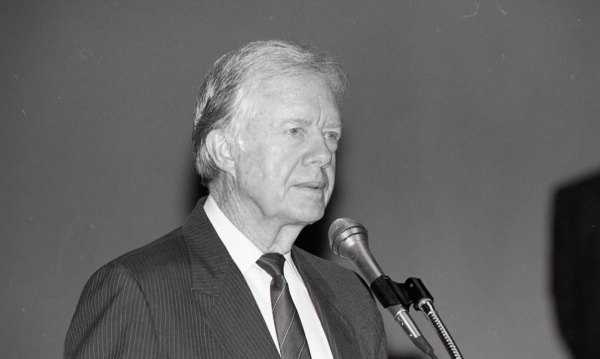Georgetown University students joined thousands of mourners in celebrating the life of former President Jimmy Carter at his casket viewing Jan. 7 and 8, days before the 39th president’s state funeral at the Washington National Cathedral on Jan. 9.
Carter, a former peanut farmer, navy veteran and governor of Georgia who served as president for one term between 1977 and 1981, died at his longtime home in Plains, Ga., on Dec. 29 at age 100. Following a 2015 diagnosis of metastatic melanoma, which spread to his liver and brain, Carter suffered years of declining health alongside his late wife Rosalynn, who died in 2023 at 96.
Following official military transport from Georgia to Washington, D.C., following his death, Carter lay in state in the U.S. Capitol Rotunda until Jan. 9, allowing the public to pay their respects.
Jenny Su (SFS ’28), an international student from China who went to the casket viewing, said she appreciated Carter’s presidency in the context of his work on U.S.-China relations, which she said enabled her to study abroad.
“He accepted 100,000 Chinese students to study in the U.S., which no other president did before him,” Su told The Hoya. “And I thought it was really impressive, because I grew up in Shanghai, and being able to study abroad is a really life-changing experience. Jimmy Carter enabled that.”

Catie Dice (CAS ’27), who also attended the casket viewing, said she witnessed Carter’s family mourn his passing, which made the experience much more impactful and humanizing.
“Not only was he the president, but he was a father, he was a husband, he was a grandpa,” Dice told The Hoya. “And I think at the end of the day, he was still a person, and whatever political opinions people have, I think humanizing is so important and I got the chance to do that by being there.”
All living former U.S. presidents attended the state funeral Jan. 9 as did the justices of the U.S. Supreme Court and international dignitaries. President Joe Biden delivered a eulogy, reflecting on Carter’s dedication to public service and his humanitarian efforts. Other speakers included Rev. Andrew Young, former U.S. ambassador to the United Nations under Carter; Steven Ford, son of late President Gerald Ford; and Carter’s grandsons. The U.S. Marine Orchestra and Armed Forces Chorus performed “Eternal Father, Strong to Save,” honoring Carter’s naval service.
Luke Hughes (SFS ’27), the protocol and special events intern for the sergeant-at-arms for the U.S. House of Representatives, said attending the event proved emotionally moving.
“I felt this overwhelming sense of patriotism, but at the end of the day, this is very emotional, this is somebody who lost their life, and the family is here to mourn that,” Hughes told The Hoya.
Carter, known for his dedication to human rights, energy conservation and peace, brokered the Camp David Accords between Egypt and Israel in 1978 and navigated the Iran hostage crisis between 1979 and 1981. After his presidency, Carter leaned into global humanitarianism through the Carter Center, a non-governmental organization championing democracy, fighting disease and advocating for fair elections worldwide.
Dice said she thinks the former president’s death brought people together to focus on his accomplishments and humanitarian efforts at a time when the country is politically divided.
“There is so much buzz and polarization about what it means to be president and what it means to be a person beyond that,” Dice said. “And with Jimmy Carter, I think people really came together to recognize his accomplishments as an American man, as well as president.”